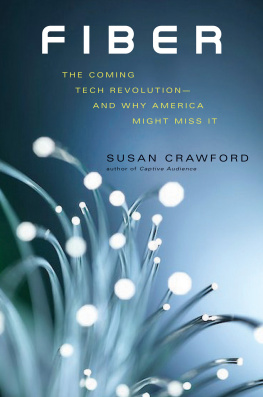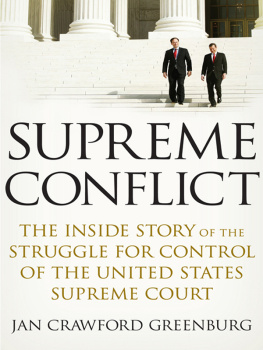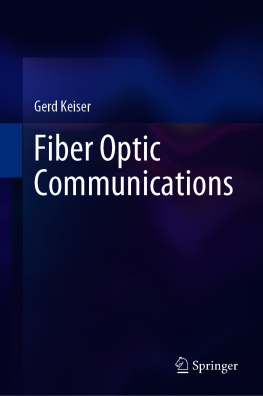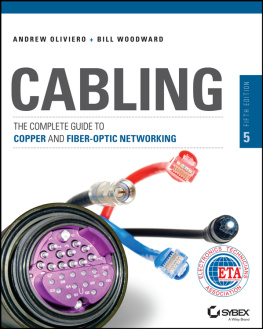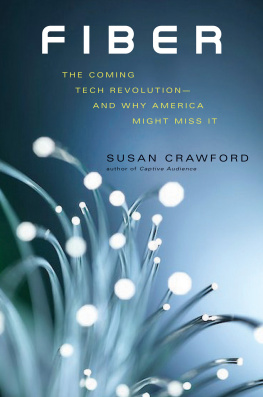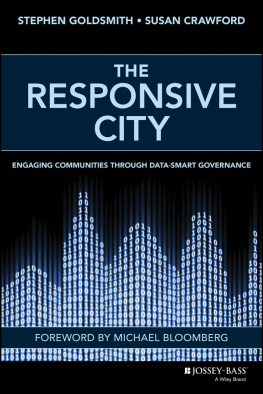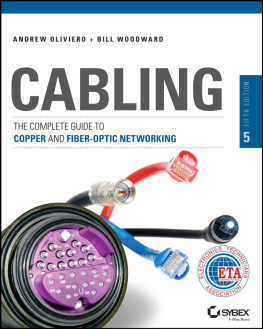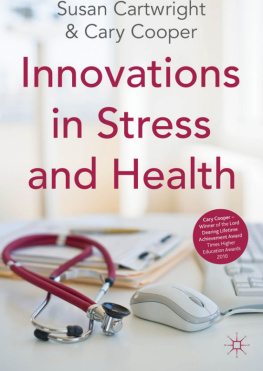FIBER

Copyright 2018 by Susan Crawford.
All rights reserved.
This book may not be reproduced, in whole or in part, including illustrations, in any form (beyond that copying permitted by Sections 107 and 108 of the U.S. Copyright Law and except by reviewers for the public press), without written permission from the publishers.
Yale University Press books may be purchased in quantity for educational, business, or promotional use. For information, please e-mail (U.K. office).
Set in Janson type by IDS Infotech, Ltd.
Printed in the United States of America.
ISBN 9780300228502 (hardcover : alk. paper)
Library of Congress Control Number: 2018944752
A catalogue record for this book is available from the British Library.
This paper meets the requirements of ANSI/NISO Z39.481992 (Permanence of Paper).
10 9 8 7 6 5 4 3 2 1
To scrappy cities
Contents
Acknowledgments
In the course of working on this book over the past five years, I have been fortunate to have had the help of hundreds of people and dozens of institutions. If I leave anyone out, forgive me; my heart, I hope, is in the right place, even if my powers of recall are limited. The Rockefeller Foundation hosted me for a crucial month of work during the summer of 2014. The Ford Foundation has supported me generously for many years. I cannot thank them enough for their encouragement of me. The Roosevelt Institute gave me a desk for a time. My employer, Harvard Law School, has given me summer research support as well as access to an extraordinary group of kind, thoughtful, and talented students. The schools former dean Martha Minow, in particular, really understood the idea that telecommunications policy is central to social justice in America and gave me every encouragement. She came by that understanding around the dinner table, because her father, a former chairman of the FCC, Newt Minow, is one of the great heroes in the communications arena.
In DC policy-land, I am forever grateful to Jim Kohlenberger, Gerry Salemme, Tom Wheeler, Joanne Hovis, Jim Baller, Chris Mitchell, Catharine Rice, Colin Crowell, Paul de Sa, Sam Gill, Ben Scott, Lev Gonick, Elin Katz, Jory Wolf, and Deb Socia.
John Horrigan and Waide Warner have been consistently wise and helpful.
Students at Harvard Law School and Harvard generally have been of enormous help to me, often in ways they could not have known at the time. I am in their debt: Andrew Crocker, Mary-Catherine Lader, Laura Kremen Adler, Danielle Kehl, Lizzy Schick, Tim Koay, Benjamin Goh, Zoe Wolford, Maxwell Gottschall, Emily Kline, Rauvin Johl, Kayla Haran, and Im sure there are others.
Other students or student-age people, not at Harvard, involved in this project have been highly important to this journey, and I thank them from the bottom of my heart: Caitlin Howarth, Alyssa Taylor, John Randall, Maria Smith, Robyn Mohr, Melissa Nally, Andrew Glantz, Dana Walters, Jess Goldfin, and Madeline Lemberg.
I have been inspired by Ron Suskind innumerable times. Clay Risen has been by my side for many projects and I cannot thank him enough. Katie Hafner gave me advice at several crucial junctures; Steven Levy, my longtime column editor, has had a major influence on me.
I traveled to Seoul, Stockholm, Tokyo, Amsterdam, Berlin, Copenhagen, Havana, and Oslo (some several times) along the way.
In Seoul, former presiding judge, Seoul Northern District Court, Jongsoo (Jay) Yoon, who always has a bass guitar in the trunk of his car, made dozens of introductions for me. I treasure his energetic, curious way of moving through life. I was accompanied in Seoul and Pyeongyang by several Harvard College, Harvard Law School, and Harvard Business School students: heartfelt thanks to Kylie Chiseul Kim, Seongmin Lee, Dianne Lee, and Sun Woo Lee, in particular. Soohyun Pae and Ye-seul Kim provided expert translation services. Korea Telecom executives agreed to be interviewed (but did not pay expenses of my trips, at my request). Other interviewees included Jinhee Park, Professor Jae Chon Park, Ram Lee, Joo Yeon Kim, Hyunseok Shim, Hyun Woo Nam, Jisoo Seo, SuhYoung Yun, Prof. Seokho Bang, JiHo Yoon, Yeon Sung Choi, Mayor Wonsoon Park, and many others.
In Stockholm, Anders Broberg made introductions that changed my life: Staffan Ingvarsson, Jonas Birgersson, Nicol Villa, Ulla Hamilton, and many others. Herman Wagter taught me about fiber in the Netherlands and northern Europe generally. In Tokyo, Seo-in Kwon took great care of me. In Havana, former ambassador John Petter Opdahl was extraordinarily helpful to me. William Ruiz was my guide in Cuba.
In Kansas City, Cate Zollicker was my guide and adviser. In Chattanooga, mayor Andy Berke opened the gates of the city to me, pointing me in all the right directions. Im a big fan of Mayor Berkes. In Greensboro, Jane Nickles was an extraordinary colleague to me. In Nevada City, John Paul was my introducer and guide. I will be forever grateful to Mark Erickson, the indefatigable beating heart behind fiber to the farm. Wilsons Will Aycock and Rebecca Agner were patient and wonderful.
I am grateful to everyone who has spent time with me. It has been quite a journey. I hope this book does your stories justice.
CHAPTER ONE
The Fiber Future
H ERE IS THE TECH revolution America may miss:
On a gray, cloudy weekday morning in August, I drove across the wide Han River that divides the northern and southern parts of Seoul. I turned east onto a furiously busy highway that runs alongside the river. I was noticing everything at once: the enormous pale forests of concrete apartment blocks, each forest pointed in a seemingly random direction, each building labeled with a number; the traffic; and the Lotte Group tower ahead of me, the tallest building in South Korea, narrowing to bat-like ears at its topit had been the CEOs dream to build the tallest tower in the country, but the structure is roundly disliked, and sinkholes have started opening at its base. The traffic in Seoul is crushing and constant, an oppressive fact of life for the ten million impatient citizens of that booming metropolis.
After a few minutes, a huge concrete stadium with fading Olympic rings decorating its side came into view. This was the Seoul Olympic Stadium, built for the 1988 Summer Olympics but not used for a major world sporting event since then. I drove on, and the forests of apartment towers and the crushing traffic continued for another twenty minutes but then fell away; I was in the suburbs and heading toward the mountains.
I had been on many journeys over the previous five years, interviewing hundreds of people in Stockholm, Seoul, Tokyo, Singapore, Berlin, Amsterdam, Copenhagen, and Havana, as well as in a long list of U.S. cities, about the possible effects on human lives of virtually unlimited, cheap, ubiquitous communications capacity. This was my third trip to Seoul. I had come to see what South Korea, the most wired nation on the planet, would show the world when it hosted the 2018 Winter Olympics, six months away.
My destination that morning was a rural, hilly area three hours east of Seoulabout ninety-five miles awaya small town of some thirty thousand people called Pyeongchang. There was no way to get there other than by driving. Although a high-speed rail link between Seoul and Pyeongchang was being built that would make a one-hour trip possible, the line hadnt been completed. No one knew how expensive the rail tickets would be, and these calculations mattered: there werent enough hotel rooms in Pyeongchang for the anticipated seventy-five thousand fans, even though buildings to house visitors were hastily being thrown up near the event venues and older structures were being pressed into new roles as hotels. Many Olympics enthusiasts would have to make a daily round trip by train from Seoul, a gigantic place with thirty thousand hotel rooms. There is no housing to speak of between Seoul and Pyeongchang and the Pyeongchang Olympic hockey center and ice arena can hold up to twenty-two thousand spectators.
Next page
